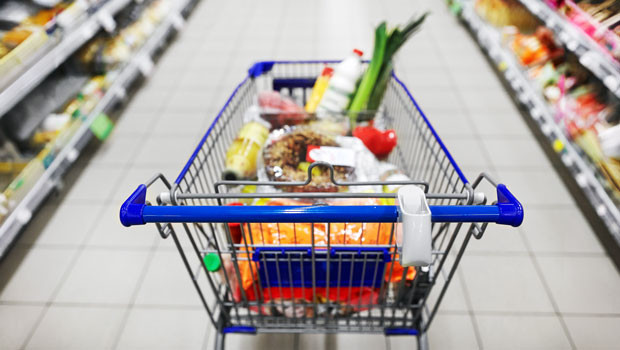Grocery price inflation rises for first time since March 2023

Sainsbury (J)
269.00p
16:40 23/12/24
Grocery price inflation in the UK has risen for the first time since March last year, according to fresh data from Kantar on Tuesday.
Food & Drug Retailers
4,444.08
17:09 23/12/24
FTSE 100
8,102.72
17:14 23/12/24
FTSE 250
20,419.09
17:09 23/12/24
FTSE 350
4,471.06
17:09 23/12/24
FTSE All-Share
4,428.73
16:44 23/12/24
Ocado Group
310.40p
17:09 23/12/24
Tesco
366.00p
17:14 23/12/24
In the four weeks ended 4 August, grocery inflation increased to 1.8%, up from 1.6% the prior month.
The shift was reflected in a mixed landscape for consumers, with prices rising across 182 product categories while falling in 89 others.
Notably, kitchen towels and baked beans were now 7% and 5% cheaper, respectively, compared to last year.
In terms of market performance, J Sainsbury achieved its largest year-on-year market share gain since 1997, rising by 0.5 percentage points.
Tesco, the UK’s largest grocer, continued its dominance, increasing its market share to 27.6% with a 4.9% sales jump.
Discounters Lidl and Aldi also saw significant growth, with Lidl's sales up 7.8% and Aldi's market share reaching 10%.
Online-only retailer Ocado recorded an 11.3% sales increase, marking its sixth consecutive month as the fastest-growing grocer.
Meanwhile, Waitrose experienced its strongest growth since November 2023, with a 4.5% rise in sales and a slight increase in market share to 4.5%.
Iceland and Co-op also saw modest gains, with their market shares standing at 2.3% and 5.9%, respectively.
Despite the financial pressures on households, the summer had seen a surge in spending tied to major sporting events.
The start of the Olympics sparked a 35% increase in wine sales, a 60% rise in nut sales, and a 10% boost in crisp purchases on the day of the opening ceremony.
Similarly, England's participation in the UEFA European Football Championship final spurred a record £10m in beer sales - the highest amount spent on a Sunday in over three years.
Kantar said the summer months also influenced consumer behaviour, with sales of seasonal items like burgers, salads, and ice cream rising by 32%, 22%, and 23%, respectively, compared to the same period last year.
However, the season also brought health challenges, as evidenced by a 28% increase in spending on cough lozenges, driven by Covid-19 and other summer illnesses.
“Having reached its lowest rate in almost three years in July, August saw inflation nudge up again slightly,” said Fraser McKevitt, head of retail and consumer insight at Kantar.
“While this is noticeable following 17 straight months of falling rates, it actually marks a return to the average levels seen in the five years before the start of the cost of living crisis.
“With this kind of pricing spread, shoppers will find that the type of product they’re putting in their baskets will really dictate how much they pay.”
McKevitt said consumers were continuing to take advantage of the range of promotions being offered by grocers to help keep the price of shopping down.
“Spending on deals rose by 15%, while sales of products at their usual price saw no increase.
“While people continue to make smart choices to manage their budgets, we should never underestimate Britons’ love of big occasions.”
Reporting by Josh White for Sharecast.com.